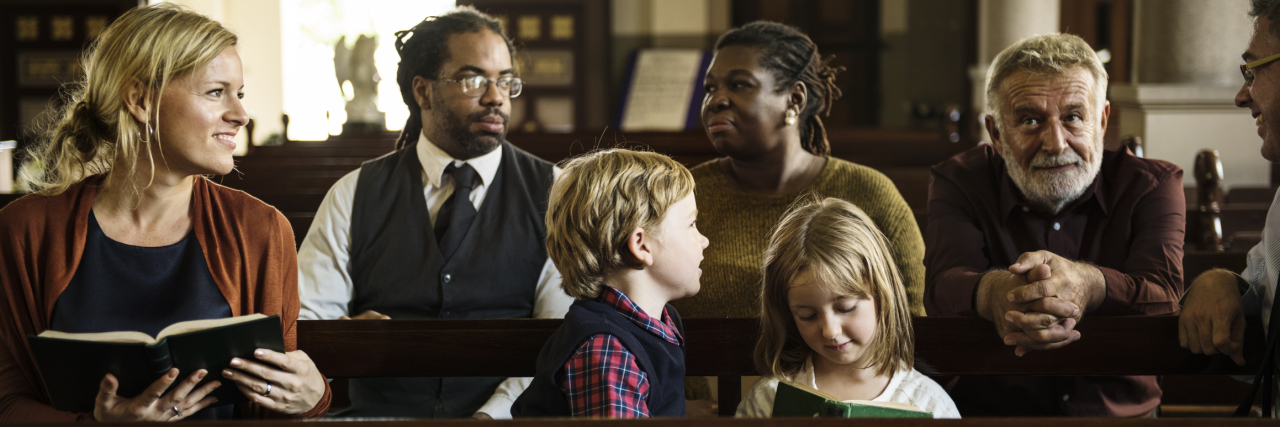Churches should be welcoming, right? I talked with several families who had members on the autism spectrum and this is what I learned.
Several people observed parishioners didn’t know how to interact with people with disabilities, so sometimes families with people on the autism spectrum were left alone and did not have any overtly negative experiences.
One respondent told me her son had a very positive experience at the church they were currently attending. People were accepting of differences, and the congregation was friendly. At this church, the pastor had a grandchild on the spectrum, which she said made him more understanding and inclusive. At two other mega-churches they attended before, their son was directed to the “special needs department,” which he did not need. This lack of understanding of his actual situation seemed patronizing to him and he would not go back to that church.
Another mother, Shelly, met personally with people in leadership roles in three different churches to explain her child’s situation. Her older teenaged son is a talented musician who wanted to get involved by playing in the worship team. One church agreed to include him in the band. However, when some difficulties arose in getting all the musicians in sync, instead of spending the additional time it might have taken to help him get up to speed with the band, the leader decided this young man on the spectrum was too much trouble, and he was asked to leave. Shelly also found out later that the pastor had said unkind things about her son during a church leader’s meeting.
In a different situation, as she moved up from the middle school group, Kimberly’s daughter, Julie, found the high school scene to be focused on socializing and on the teens who were leading the worship music. The environment was supportive of the musical talent of these kids, leading them to rise to the top in what quickly became a popularity contest, and girls and guys who had previously been Julie’s friends in the middle school group began to ignore her. When Kimberly met with the youth group leader to explain autism, he wanted to assign another girl to be her friend, but Kimberly said Julie would see right through that. She suggested instead that he create more structure for the group meetings, as she knew there were other introverted teens who were having a hard time with the long periods of unsupervised small talk and general chaos. His response was that the majority liked the arrangement as it was, and as the group was growing quickly, Julie would just have to get used to the way things were. Due to all the factors that were making youth group overwhelming for Julie, Kimberly decided to let her stop attending. Then, she was criticized by other parents in the church for not requiring her daughter to attend. The family eventually left this church for one that was much smaller, where they are happy.
The church seems to have a hard time with anybody being different. I think this problem extends far beyond the world of autism. No room is left for people to be different and for people to be loved as they are. If you don’t raise your hands occasionally during the songs, get into the music and smile at everyone, and if you aren’t comfortable holding hands during group prayer, you can be criticized as being un-Christian. Yes, a pastor actually told the congregation from the pulpit that if you did not join hands with others, you were un-Christian. These attitudes dismiss the challenges those with autism and other disabilities face every day.
If a person has extreme social anxiety or a physical condition which would prevent her from holding hands during a group prayer, this would probably be understood. The same consideration should always be extended to any person who is worshiping in a congregation. Consider that for people on the spectrum, sensory input or a change in routine can be overwhelming, and these challenges can be something as simple as your talking to her while she is worshiping, or asking her to move out of her accustomed spot. These are concerns that neurotypical people often are not aware of. But now you know — large group gatherings can be overwhelming for other minds.
You might see this as “odd” behavior, but the focus should be in honoring the needs and feelings of the other person. Your ideas about what is socially acceptable behavior may be upset, but what is important is that members of the body of faith experience the grace and peace the church is meant to share.
Love the person as he is and where he is. Continue to acknowledge the person even when you don’t seem to be getting a response; smile when you see him; ask how he is. Over time, your consistent love and kindness may be rewarded. There are many valid reasons why a person may not be either able or willing to do exactly as the majority of the church body is doing during worship. These reasons should not keep a person from being loved, valued and included.
Getty image by Rawpixel

